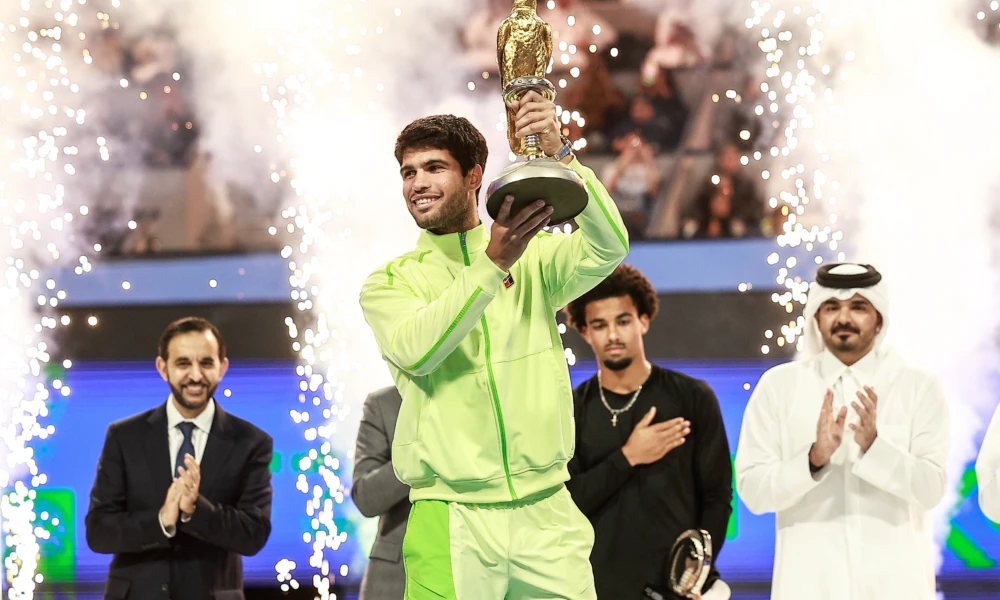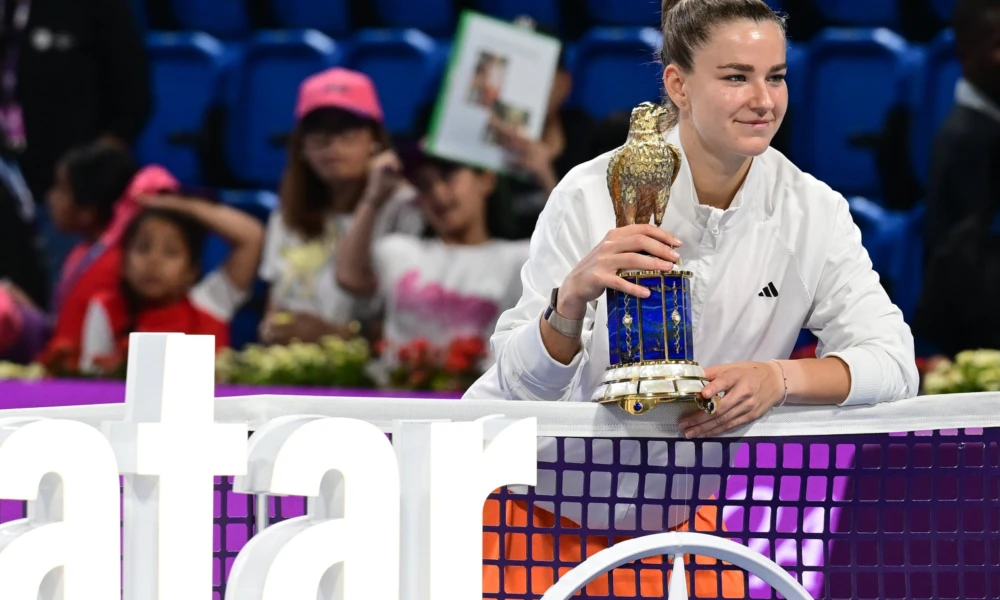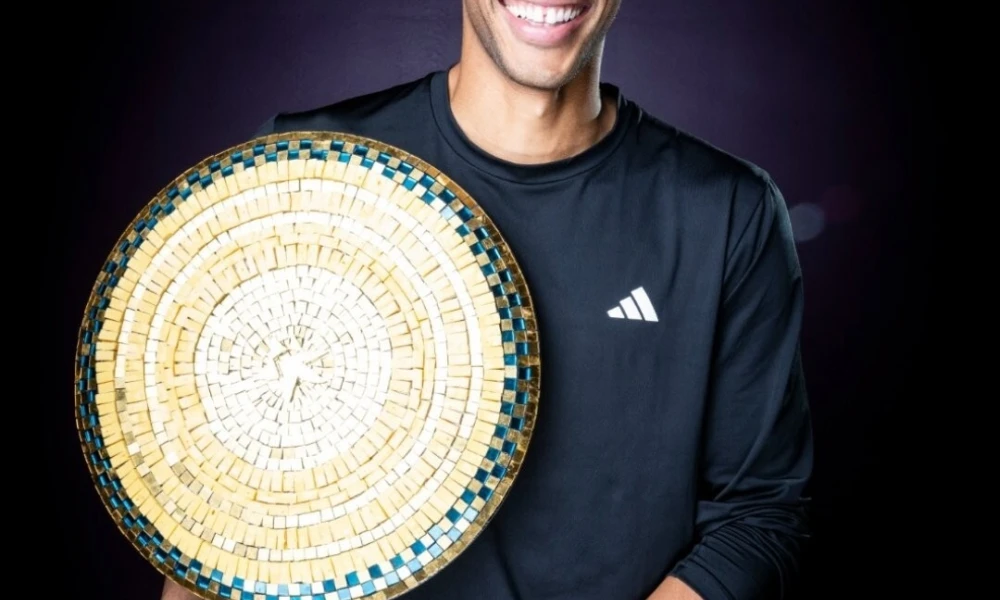by Mike McIntyre They call it the Happy Slam, and for Aryna Sabalenka the Australian Open was certainly that as the 24-year-old captured her first major title while playing some of the best tennis of her career. The first-time Slam winner punished the ball off both wings and with her lethal serve when she needed it, defeating Elena Rybakina 4-6, 6-3, 6-4 for the championship.
Witnessing a player capture their first major is always special and for Sabalenka this was no exception. She first cracked the Top Ten on the WTA Tour in 2019 and in recent years has been often mentioned as one of the most talented women yet to win a Slam. She no longer has to endure that kind of talk with her victory in Melbourne and this could well be the first of many such titles.
Sabalenka came into the Australian Open playing terrific tennis as evidenced by her capturing the title in Adelaide without dropping a set. That trend continued in her maiden Slam run as well up until the finals against Rybakina where she dropped the opening set before correcting course and securing the win.
Both women were playing near flawless tennis coming into the championship match. Sabalenka had defeated seeded players such as Belinda Bencic and her often doubles partner Elise Mertens, as well as the resurgent Donna Vekic and surprising Magda Linette – a first-time Slam semifinalist.
Rybakina, perhaps even more impressively, had taken out four fellow seeded players and three previous Slam champs en route to the final. In the third round she beat established Aussie Open competitor and 2022 finalist Danielle Collins in three sets. She then went on to topple World No. 1 Iga Swiatek (in straight sets!), former French Open champion Jelena Ostapenko and two-time Aussie Open champ Victoria Azarenka in the semis.
There’s never a guarantee that the finals of any tournament will be a compelling one, but the duel between Sabalenka and Rybakina was a competitive one with both players showcasing their arsenal of weapons.
Rybakina was first to break serve early-on in the first set for a 2-1 lead before Sabalenka later tied it up at 4-4. Rather than build on that momentum however, Sabalenka would immediately be broken back and drop the next two games to see Rybakina take the opening frame in 34 minutes.
Heading into the match, many wondered how Sabalenka would handle the nerves of playing in her first Slam final, especially against Rybakina who won Wimbledon just last summer. But rather than succumb to the pressure of being down a set, Sabalenka found her resolve and upped her consistency as the match went on.
In the second set there was little that separated the two opponents, though a Rybakina forehand that sailed long allowed Sabalenka to take the first and only break of the set for a 3-1 lead. Sabalenka didn’t waiver and sealed the second set 6-3 with an ace that pushed things to a decider.
At 3-3 in the final set Sabalenka converted on her third break point chance on an overhead smash from the back of the court to take the crucial 4-3 lead. Getting so close to her first major title, things understandably got a little loose in the final game of the match while Sabalenka led 5-4. She double faulted on her first championship point at 5-4, 40-30 and had to save a break point later in the game as well, but on her third championship point, Sabalenka smacked a cross court forehand that led to an error from Rybakina who sent the ball long. Sabalenka fell to the court, covered her eyes and wept tears of joy as she realized what she had just accomplished.
Despite failing to capture her second career Slam, one has to think that we’ll be seeing Rybakina contend for more big trophy’s in the future. At only 23 years old, she has now made her second major final in less than a year and still has much room to develop as a professional tennis player.
For Sabalenka, her victory confirms her place near the top of the women’s game. She now has titles at every level of WTA tournament and a Grand Slam as well. Through the first fourteen majors she played in her career, Sabalenka went 16-14 with her best result being two Round of Sixteen finishes. In her last seven majors, the improvement is quite something as she has gone 27-5 with one title and three other semifinal appearances. She’s back up to her career-high of No. 2 in the world as well.
“It’s the best day of my life right now,” said Sabalenka after the win. The Happiest Slam of her career.
THE REST OF THE FIELD
As Maria Sakkari said on an episode of “Break Point”, the new series from Netflix, “The rest of us are going to lose more than we win.” So it goes for the other 127 players in the Aussie Open field who leave Melbourne empty handed. Let’s not forget to recognize some of these fierce competitors who nonetheless had a strong tournament.
33-year-old Vika Azarenka looked almost as good as she did ten years ago when she captured her second consecutive Aussie Open title. She made the semifinals this year before falling to Rybakina. Most recently, she made a Slam final in 2020 at the US Open, but she proved she can still contend with the 20-year-old talents of the “new age” WTA.
Unseeded Polish player Magda Linette had her best-ever showing at a Slam as she too made the semifinals before having her dream-run end at the hands of Sabalenka. The 30-year-old took out four seeded players including Anett Kontaveit, Ekaterina Alexandrova, Caroline Garcia and Karolina Pliskova.
2017 French Open champion Jelena Ostapenko made the first hard-court Slam quarte-final of her career after defeating rising American star and seventh seed Coco Gauff in the fourth round. It was her best showing at the Australian Open in eight career appearances.
WOMEN’S DOUBLES
It was no surprise in the women’s doubles draw to see the all-Czech team of Barbora Krejcikova and Katerina Siniakova hoist their seventh major title together. The No. 1 seeds defeated the Japanese duo of Shuko Aoyama and Ena Shibahara 6-4, 6-3. In 2022 they won the Aussie Open, Wimbledon and the US Open and are proving to be quite ready to continue that level of play in 2023.
CANADIAN CONTENT
It was a tough tournament for Canadian hopes in both women’s singles and doubles. Bianca Andreescu and Leylah Annie Fernandez both suffered from being unseeded and placed in difficult sections of the draw.
Andreescu was surprised in the second round by 86th ranked Cristina Bucsa, while Fernandez put up a good fight but couldn’t solve fourth-seeded Caroline Garcia. Garcia had already defeated another Canadian in Katherine Sebov in the opening round. Still, it was a positive experience for Sebov who had just qualified for the main draw at a major for the first time in her career. Rebecca Marino was also in Melbourne, her third consecutive Slam main draw without having to endure qualifying, but was beaten in the opening round by Zhu Lin.
In doubles, Canada’s Gaby Dabrowski can normally be expected to make the second week of competition, but this year fell in the second round of mixed doubles with Max Purcell and in the third round of the women’s doubles with Giuliana Olmos.








